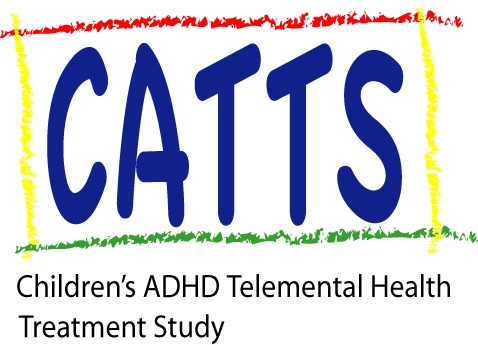Information for Physicians
Video for physicians
Click to view a video with information for physicians.
Referring patients to the CATTS Study:
| 1 | Talk to the family about the study. If the family is interested, provide the family with the Letter For Parents . This letter informs family that CATTS personnel will contact them to begin the screening process |
| 2 | Fax the New Assessment Referral Form (NARF) to 206-985-3121. Please include relevant clinical documentation. |
| 3 | We will send you a letter updating you on the study status of your patient. |
Seattle ChildrenÔÇÖs Hospital (SCH) is conducting a 5 year study funded by the National Institute of Mental Health (NIMH) on the effectiveness of telemental health (TMH) in treating children with Attention-deficit Hyperactivity Disorder (ADHD). ADHD is the most common psychiatric disorder of childhood and many primary care physicians are becoming proficient in the pharmacological treatment of ADHD. Yet many children with ADHD are still not getting treatment, or need further services.
Children with ADHD may not be identified and treated because they have comorbid disorders that complicated their clinical presentation and treatment. Other children have difficulties tolerating ADHD medications or need additional medication. In some communities there are no primary care physicians that treat ADHD and there are few child and adolescent psychiatrists available in non-metropolitan counties to provide consultation. Additionally, many communities do not have access to evidence-based behavioral training for families of children with ADHD. In this study, we hope to demonstrate that telemental health is ÔÇťvalue added,ÔÇŁ i.e., that by providing evidence-based treatment through telemental health, outcomes of youth with ADHD can be improved.
Because this is a study of the effectiveness of telemental health, we are interested in a wide range of ADHD children, those newly diagnosed to those with moderately servere or comorbid ADHD.
All children participating in the study receive care (i.e., there is no true control group). They are assigned to one of two interventions that last 30 weeks:
- Group A: 6 sessions, 3-5 weeks apart, with a child and adolescent telepsychiatrist who has expertise in the treatment of ADHD; plus 6 sessions with a local therapist who is supervised by a telepsychologist in the delivery of parent behavioral training for children with ADHD.
- Group B: A single consultation with a child and adolescent telepsychiatrist who has expertise in the treatment of ADHD. The telepsychiatrist then provides treatment recommendations to the childÔÇÖs primary care physician who continues care for the next 30 weeks.
We hope that by demonstrating that TMH is effective in treating ADHD, private and public insurers will be compelled to include it in their benefit packages for families living in underserved communities.
The study treatment sessions are free of charge to families. However, families must pay for their medications.
CATTS is fully funded by the National Institute of Mental Health in Washington DC. No drug company money is sponsoring the study.
Eligibility Criteria:
| child is 5.5 to 12 years old | |
| child has a diagnosis of ADHD or symptoms suggestive of ADHD | |
| child does not miss more than one day per week of school | |
| child is not a ward of the state (not in foster care) | |
| child and parent speak English (predominantly Spanish-speaking families with some conversational English are also eligible) |
|
| child lives with a legal guardian (parent or relative) who can bring him/her to the sessions | |
| child is not residing with a guardian who has a drug use problem | |
| family lives within driving distance to one of the following cities: Olympia Longview Wenatchee Richland Boardman OR | |
| child has a primary care doctor whom we can contact about participating in the study | |
| child and primary caregiver are willing to complete assessments several times during the study | |
child does not have a diagnosis of: |
|
|
Links
- Description of the scientific aspects of the study, including study groups and study procedures
- The referring physicianÔÇÖs responsibilities with each of the two treatment groups
- The New Assessment Referral Form (NARF) to refer your patient to CATTS
- Flyers to distribute to families and other physicians:
Oregon Flyer
Washington Flyer - University of Colorado website on telemental health
Publications on telemental health
- Child and Adolescent Telepsychiatry: Variations in Utilization, Referral Patterns and Practice Trends
- Feasibility, Acceptability, and Sustainability of Telepsychiatry for Children and
Adolescents - Telepsychiatry with Incarcerated youth
- Child and Adolescent Telepsychiatry: Utilization and Satisfaction
- Telepsychiatry with Children and Adolescents: Are Patients Comparable to
Those Evaluated in Usual Outpatient Care? - Practice Parameter for Child and Adolescent Telepsychiatry
Telemental Health Standards and Guidelines Working Group (Grady B, Myers K, Nelson EL, Co-Chairs): Evidence-Based Practice for Telemental Health, American Telemedicine Association; July, 2009
Telemental Health Standards and Guidelines Working Group (Grady B, Myers K, Nelson EL, Co-Chairs).
Practice Guidelines for Videoconferencing-Based Telemental Health, American Telemedicine Association; October, 2009

